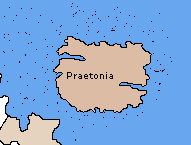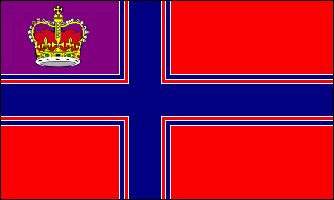Difference between revisions of "Praetonia"
| Line 16: | Line 16: | ||
|'''[[Wikipedia:Capital|Capital]]''' || [[Kingston]] | |'''[[Wikipedia:Capital|Capital]]''' || [[Kingston]] | ||
|- | |- | ||
| − | |'''Monarch''' || [[ | + | |'''Monarch''' || [[George IV of Praetonia|King George IV]] |
|- | |- | ||
|'''Prime Minister''' || [[Tiberius Polax|Sir Tiberius Polax]] | |'''Prime Minister''' || [[Tiberius Polax|Sir Tiberius Polax]] | ||
Revision as of 16:09, 8 February 2007
| |||||
| Motto: Vox Populi, vox Dei | |||||
 | |||||
| Spoken Languages - De-facto |
Latin, English, Composite Praetonian | ||||
| Capital | Kingston | ||||
| Monarch | King George IV | ||||
| Prime Minister | Sir Tiberius Polax | ||||
| Area - Total - % water |
10,374,236 km² 17.23% water | ||||
| Population - Total (2007) |
5,742,000,000 | ||||
| Establishment - Current Form - Original |
17th March 1761 Antiquity | ||||
| Government Type | Westminster System | ||||
| Constitutional Form | Constitutional Monarchy | ||||
| GDP (2005) - Total (USD) - GDP/capita (USD) |
$364,490,676,000,000 9th]) $63,478 | ||||
| GDP Growth Rate: | 7.62% (2006) | ||||
| Unemployment: | 1.92% | ||||
| Currency | 1 Crown (Cr) = 20 Shillings (s) = 5 Denarii (d) | ||||
| International Abbreviations | CCP, IMP, IP | ||||
| Naval Craft Classification - Imperial Navy - Imperial Merchant Navy - Royal Naval Flotilla |
PWS IMS RNS | ||||
| National Anthem | For Thee, Oh Pleasant Land | ||||
| Internet TLD | .ip | ||||
| Calling Code | +45 | ||||
The Crown Commonwealth of Praetonia is a unitary Empire whose mainland is located in North-East Haven, surrounded by the Vascian Gulf, a sea which encompasses Praetonia's mainland territorial waters and Economic Exclusion Zone. The sea contains numerous small islands claimed as Crown Dependancies, many of them housing small military observation and defence bases.
Mainland Praetonia has no land borders and proposals to build a tunnel to nearby Willink have been consistently rejected due to national security concerns. Praetonia does, however, share land borders through her colonies with a number of countries, including Sarzonia, Hamptonshire and the Borman Empire. Praetonia's several former colonies which have recently been legally amalgamated to form a unitary Crown Commonwealth of Praetonia. The former colonies maintain very strong cultural and private economic links which have been strengthened by complete political union.
Praetonia has a strong free market economy and a well funded and professional military, of which the navy is especially well regarded. Praetonia wields a great deal of diplomatic power through her foundership of the Sovereign League and her membership of both ACTO and APOC and pursues a foreign policy aimed at promoting Praetonia's national interest, free trade and liberty. In recent years relations with the CAD powers formerly viewed as enemies have thawed.
History
Praetonia was a feudal monarchy until the First Civil War in the 17th century. This war culminated in the Battle of Kingston and the Storming of the Palace in 1653, during which the King was captured by the Patrician Parliamentary army and subsequently executed in public after trial before the House of Commons, the rest of the Royal Family being allowed to go into exile in Questers. In 1654 the Grand Commonwealth of Praetonia was proclaimed, abolishing the Monarchy and House of Lords and vesting all sovereign power in the House of Commons, whose own ability to act was severely constricted by the Charter of the Rights of the People which was created at the same time and banned the levying of taxation above 1% of income on any person and the levying of any taxation against capital transfers other than income.
An extremist libertarian construct, the Grand Commonwealth was resisted directly and indirectly by rural areas throughout its existance and as a result suffered from repeated famines until the establishment of the National Grain Reserve in 1708, which stored grain imported from Praetonia's fledgling colonies and which has endured to this day. Although subject to much instability and corruption, especially in the wake of its controversial decisions to privatise the military and the judiciary in 1655 and 1672 respectively, the Grand Commonwealth presided over the longest period of sustained economic growth in the history of Praetonia and the accompanying benefits in quality and length of life for the people.
The end of the Grand Commonwealth began in 1756 when the National Grain Reserve, which had prevented famine since its inception 48 years earlier, failed to supply sufficient food to the city dwellers. This, combined with wide-spread disatisfaction with the general non-existance of and where existant abuses of power by the now privatised police force and military, lead to a popular uprising in favour of a New Monarchy. This was opposed by a large minority of people who remained loyal to the ideals of the Grand Commonwealth and the resulting civil war lasted for another 5 years. In 1761 the rightful heir to the throne, King George I, having returned from Questers and served in the war, re-entered Kingston to muted fanfare, ruling in the manner of Charles I with a Parliament still in existance but significantly weaker than that under the Grand Commonwealth.
The new Kingdom of Praetonia, despite starting on much stabler grounds than the Grand Commonwealth, fell much more quickly, in 1820, following the disastorous reign and early death of King George II, the heir of his namesake. The 'Third Civil War', as it is sometimes called, was in fact a bloodless coup in which Parliament seized control of the capital with public and military consent and invited a Questerian relative of the royal family, Queen Elizabeth I, to take the throne. The governments that emerged became progressively more nationalist and socialist in their outlook. At the time it was widely believed that state monopolies were the most efficient means of running an economy, and much of the economy was nationalised. This was resisted by a significant minority of the population, mostly the descendents of those who had fought for the Commonwealth in the Second Civil War, and many businesses moved abroad. Warburton Coal Ltd. gained a parliamentary exemption after the 2nd Duke of Warburton and his workforce threatened to flood the mines and bring the country's economy crashing to a halt.
The process of nationalisation and socialisation was completed when the Liberal Imperialist Party rose to power to wide-spread public acclaim and ended millenia of isolationism. Liberal Imperialism endured for more than two decades, when a swing back towards liberalism brought the Liberal Tory Party, itself a faction split from the Liberal Imperialist Party, to power. The Party proceeded to privatise all of the state industries and welfare service, drastically cut back on taxation and introduce wide-spread deregulation. The 'Liberal Tory revolution' has been heralded as a 'New Renaissance', having brought unparralled growth in the power and prosperity of the country as well as a large increase in the liberty of the individual Subject.
Economy
| The Sovereign League NSWiki Index |
|---|
| Main page: Sovereign League |
| Member Nation Pages: Allanea • Aralonia • Czardas • Franberry •Questers • Praetonia • Skinny87 • Space Union • Velkya • Willink • Whyatica |
| Related Pages: #draftroom, Haven |
| Nations of Haven |
|---|
| Nations: | Allanea | Ato-Sara | Aunesia | Cravan | Edolia | Franberry | Foe Hammer | Hallad | Hamptonshire | Hattia | Hogsweat | Izistan | Jaredcohenia | Kampfers | Mauvasia | Midlonia | No_Endorse | Okielahoma| Omz222 | Praetonia | Questers | Scandavian States | Skinny87 | Velkya | Willink | Whyatica |

